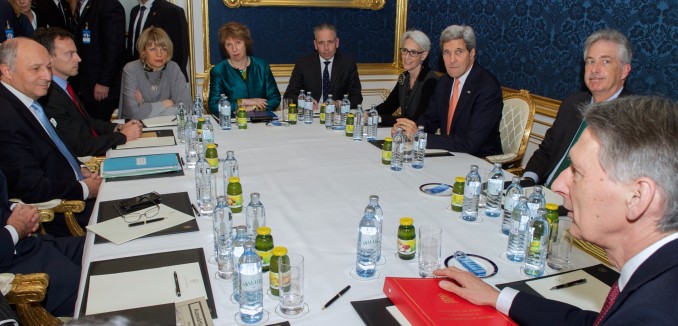Media outlets in the Arab world are reporting today extensively on the nuclear talks between Iran and the P5+1 powers, and largely denouncing the Western willingness to extend the deadline for achieving a nuclear agreement.
According to certain commentators in Arabic language outlets, Iran held the upper hand in the last round of talks and managed to force its position on six world powers, even though no final agreement was signed between the two sides.
“Iran won,” wrote Fateh Abd al-Salam in the A-Zaman newspaper (Arabic link). “Tehran has shown that it has the last word when it forced the postponement of the signing of the agreement until next July.”
Some Arab publicists agree with Israeli intelligence concerns that Iran will use the extension to develop its military nuclear program under the nose of the international community. However, they believe that United States and the other world powers still have a chance to fix their policies towards Iran.
Many of Iran’s Arab neighbors worry that a possible final deal will give Tehran more regional power. All Arab countries apart from Syria and Iraq are ruled by Sunni Muslim leaders who generally regard Shi’ite Iran as an enemy. This is a matter of serious concern that put many Arab leaders on the same page as Israel.
Meanwhile in Iran, hardliners criticized the negotiators from a different perspective. “Nuclear energy is our absolute right,” and “Sanctions won’t stop us,” read placards held by protesters in a rare demonstration outside an atomic facility in Tehran.
They chanted “Death to America” while speakers addressing the demonstrators raged on the conduct of the year-long negotiations, Al-Arab newspaper reported. Iran’s President Hassan Rouhani and Mohammad Zarif, the foreign minister who leaded the talks in Vienna, “do not know how to do diplomacy,” one speaker said.
The P5+1 powers have been locked in talks with Iran since February in an attempt to turn the interim Geneva accord into a lasting agreement. Yesterday, the sides agreed to extend the talks.
A lasting deal is aimed at forcing Iran to open its nuclear energy program to UN inspection so that the international community can finally determine whether Iran is conducting military research under the guise of a civilian nuclear program. While Tehran denies that it wants to develop nuclear weapons and insists its nuclear program is entirely peaceful, it continues to block multiple inspection requests by the International Atomic Energy Agency (IAEA) into a number of its facilities.
Prior to yesterday’s deal, one of the common fears expressed in the Arab media was that the nuclear deal would ignore Arab interests.
[Photo: U.S.Embassy Vienna / Flickr]




